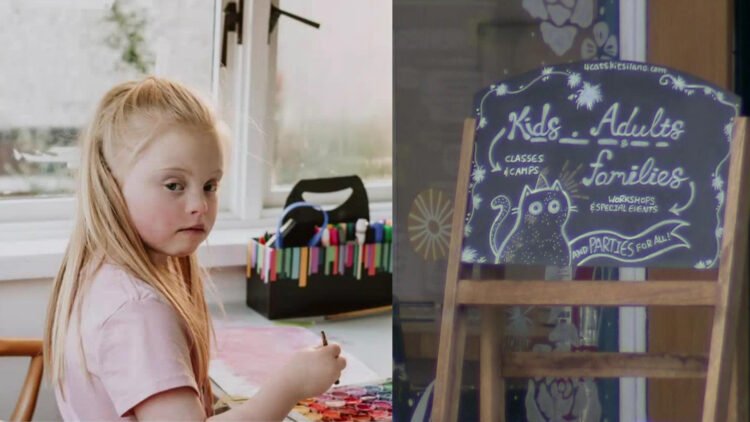Kenzie Jameson, a lively nine-year-old girl from Vancouver, has a passion for soccer, music, and art. According to her mother, Katie Jameson, Kenzie is full of personality—sassy, a dedicated Taylor Swift fan, and an enthusiastic painter.
Kenzie also has Down syndrome, autism, and is non-verbal. However, her mother prefers to mention these aspects last, believing that once people become aware of her daughter’s disabilities, they often make assumptions about her abilities and who she is as a person.
Recently, Kenzie was denied entry to a painting workshop at the Kitsilano branch of 4Cats, a Canadian art studio chain. According to Jameson, the rejection was based solely on her daughter’s disability.
“We were simply looking for a welcoming space where she could sit alongside kids her age for a couple of hours each week,” Jameson explained. She highlighted how difficult it is to find community programs that truly include children with Down syndrome.
When registering online, Jameson outlined Kenzie’s support needs, explaining that all she required was to sit quietly beside her daughter and assist her with painting. “I expressed how thrilled we were,” she said. “I wrote about Kenzie’s love for art, painting, and colors, and how this class would be an important creative outlet for her since she is non-speaking.”
However, emails shared with CTV News show that 4Cats Kitsilano cited its policy prohibiting outside observers in class.
“Unfortunately, we can’t make exceptions to this policy and cannot have you in the class,” read one email.
A follow-up email from the studio stated, “4Cats is not equipped or trained to support children with specific needs in our regular classes. As part of our policy, we do not allow adults in the classroom, as their presence can sometimes disrupt the experience for other children.”
Jameson was directed toward a different weekend class designed for parents and children, but she explained that it wouldn’t provide Kenzie the same opportunity to create alongside her peers.
In an effort to find a solution, Jameson even offered to remain outside while a staff member assisted her daughter. However, she was told that the studio was not equipped to support children with additional needs.
“I was offering them the chance to include a child with a disability at no cost to them—without changing their policies, staffing, or structure in any way,” Jameson said.
“People often assume that accommodating a disability is incredibly difficult, but in this case, it wasn’t. It was simply an adult sitting next to a child, helping her paint in an art class.”
4Cats Responds
In a statement to CTV News, 4Cats founder and CEO Joey Simon expressed regret over the incident.
“I am deeply sorry about what happened with Kenzie, and we want to make it right,” Simon said.
She added that while she had spoken with the Kitsilano studio, she had yet to speak directly with Jameson. She confirmed that plans were in motion to discuss the issue and that 4Cats would update its inclusion policies and share them on its website “as soon as possible.”
“As an inclusive art studio, we welcome students of all abilities and developmental needs,” Simon stated. “We will be meeting with Kenzie’s mother and an inclusion consultant to better understand their perspectives and explore ways we can improve.”
A Larger Issue of Accessibility
Jameson sees this incident as part of a broader, systemic issue surrounding accessibility. She believes the repeated rejection of children with disabilities from community programs has lasting emotional consequences—for both children and their parents.
“To hear ‘no’ time and time again, to be told your child isn’t allowed to participate, isn’t allowed to share experiences with their peers, isn’t allowed to learn and grow like other children—it takes a toll,” she said, fighting back tears.
According to Jameson, Kenzie already spends summers alone, unable to attend camps or join many community programs.
“By allowing community programs to maintain policies that exclude my daughter, we are reinforcing a future where she is more easily ignored as an adult,” she explained.
“When we treat people with developmental disabilities as less deserving of rich experiences and meaningful connections, we contribute to a reality of isolation and loneliness.”

 English
English



























































